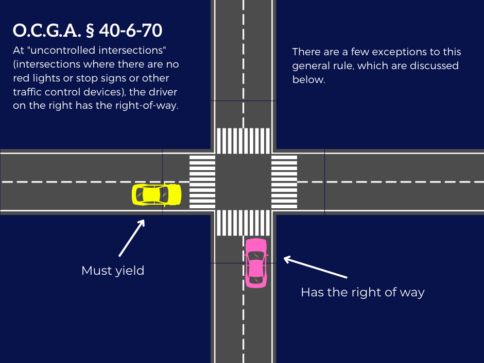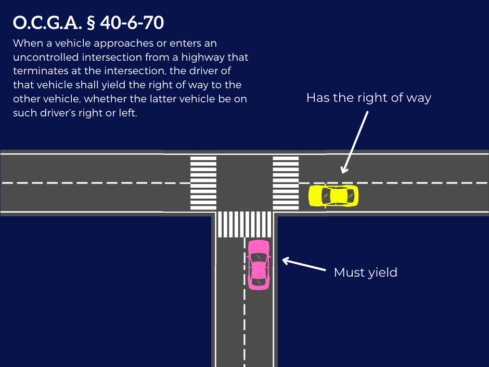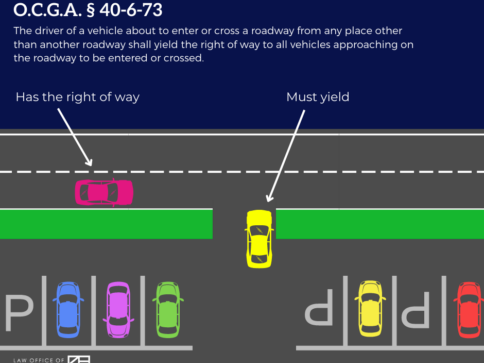Aggressive, Compassionate, & Responsive Criminal Defense
Get in touch
Please contact me using the form below
Get in touch
Please contact me using the form below
Failure to Yield in Georgia
Every time you get behind the wheel of a car, you have to consider the other drivers on the road. A critical aspect of driving is knowing who has the "right of way." Simply, right of way means "who gets to go first" when two cars approach each other on the road. Georgia law has several sections dealing with "right of way." These sections instruct drivers on who has the right of way in various specific circumstances.
Failure to follow the rules in these sections can result in being charged with Failure to Yield to Right of Way, especially if an accident results. Failure to Yield is a misdemeanor traffic offense in Georgia. This article will detail the various code sections dealing with right of way as well as the charge of Failure to Yield.
Right of way rule for vehicles approaching or entering intersection
The applicable code section here is O.C.G.A. § 40-6-70. This code section states that when two vehicles approach an intersection from different roads simultaneously, the driver on the left must yield to the driver on the right. Click here or see Img. 1 for a diagram of what that looks like. This section is only applicable to "uncontrolled" intersections, which are intersections where there are no traffic lights, stop signs, or other traffic control devices. As with most provisions of the law, there are exceptions.
One exception occurs when a driver approaches an intersection from a road that ends at the intersection (think an uppercase T). That driver must yield to drivers on the intersecting street, regardless of who is on the right or the left. Click here or see Img. 2 for a diagram of what that looks like.
Another exception is when there is a traffic light, but it is not functioning (it's in "unactivated dark mode" according to the law). Drivers must treat this as a stop sign, and everyone must stop. Click here for more information about stop signs and how drivers must approach intersections with stop signs. However, drivers do not need to stop if the traffic signal is marked as a pedestrian beacon or ramp meter and is inactive. If it is flashing red, drivers must stop. If it is flashing yellow, drivers must drive with caution.
Yielding during left turns
The code section relating to left turns is O.C.G.A. § 40-6-71. It states that a driver intending to turn left into an alley, private road, or driveway must yield to vehicles approaching from the opposite direction in the intersection or close enough to create a safety hazard.
Yielding at Stop Signs
O.C.G.A. § 40-6-72 deals with yielding at stop signs and yield signs. See my Failure to Stop at a Stop Sign page for a detailed look at the rules surrounding stop signs.
In general, drivers must stop at stop lines and crosswalks if a stop sign is present. If there is no stop line or crosswalk, drivers should stop in a place with a clear view of the intersecting roadway. This allows them to check for approaching traffic before entering the intersection. Once they have stopped, they must yield the right of way to vehicles in the intersection or approaching the intersection.
If a yield sign is present, drivers must slow down to a safe speed (taking into account road and traffic conditions). If they cannot proceed safely, they must stop at the stop line or crosswalk (whichever is present). If there is no stop line or crosswalk, they must stop before entering the intersection. After slowing or stopping, drivers must yield to vehicles in or approaching the intersection.
If a driver fails to stop at a yield sign and is involved in an accident, courts may consider this evidence that the driver failed to yield.
These rules surrounding stop signs and yield signs apply unless there is signage to the contrary or a police officer is directing traffic.
Right of way rule for drivers entering the road from somewhere other than another roadway
The applicable code section here is O.C.G.A. § 40-6-73. O.C.G.A. § 40-6-73 deals with entering or crossing a roadway from a place other than another road. For example, if you are pulling out of a parking lot back onto the road, this would apply to you. The law states that drivers entering or crossing a road must yield to cars approaching on the roadway. See Image 3 to see how this works.
Yielding to emergency vehicles
O.C.G.A. § 40-6-74 requires drivers to yield to emergency vehicles. It states that, upon the approach of an emergency vehicle, drivers should move to the right-hand edge of the roadway and remain there until the emergency vehicle has passed. They should not block intersections. Drivers need only yield to emergency vehicles when the emergency vehicle's siren is engaged or its lights are flashing. Drivers must follow this rule unless a law enforcement officer on the scene gives specific directions to do otherwise.
Highway construction and maintenance personnel and vehicles.
O.C.G.A. § 40-6-75 pertains to construction workers and vehicles. In construction or maintenance zones, drivers must yield to vehicles or pedestrians engaged in road work. Drivers can identify construction or maintenance zones by signage or traffic control devices.
Even outside of construction or maintenance zones, drivers must yield to vehicles engaged in road work that display flashing or revolving amber lights.
What are the consequences of a Failure to Yield conviction in Georgia?
Failure to yield the right of way is a misdemeanor offense in Georgia. Oftentimes, the police will charge drivers with this offense after a traffic accident.
Technically, Failure to Yield carries a possible sentence of up to 12 months in jail or on probation. However, most people charged with Failure to Yield will pay a fine and not go to jail. That does not mean you do not need to take a Failure to Yield ticket seriously. Legally, courts may charge up to $1,000 in fines (plus court costs and fees) for misdemeanor offenses, including Failure to Yield. The actual amount will depend on the jurisdiction, the judge, your traffic record, and whether you are charged with other traffic offenses in addition to Failure to Yield.
In addition to steep fines and fees, a conviction for Failure to Yield can affect your driving privileges. Failure to Yield is a 3-point offense. By itself, a conviction for Failure to Yield will not result in a license suspension. However, if you already have a few tickets on your driving record, you may have issues. Click here for more information about license suspensions resulting from too many points on your license.
Traffic offenses such as Failure to Yield can also have collateral consequences. For example, they can impact your ability to get certain kinds of jobs or to get security clearance. Convictions will also raise your insurance rates for several years.
Why you need a Georgia Traffic Court Attorney for a Failure to Yield ticket
Most people don't take traffic tickets very seriously. In my opinion, that is a mistake. As discussed above, even seemingly minor offenses can have serious consequences. Some of these consequences are not easy to foresee. As your criminal defense lawyer, it's my job to anticipate these issues and help you prevent them. If you have been charged with Failure to Yield in Georgia, give me a call today.
Learn More
Writer
Share This Page
Or click here to send me a message.
Get in touch
Please contact me using the form below



